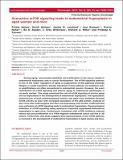| dc.contributor.author | Bajwa, Preety | en_US |
| dc.contributor.author | Nielsen, Sarah | en_US |
| dc.contributor.author | Lombard, Janine M. | en_US |
| dc.contributor.author | Rassam, Loui | en_US |
| dc.contributor.author | Nahar, Pravin | en_US |
| dc.contributor.author | Rueda, Bo R. | en_US |
| dc.contributor.author | Wilkinson, J. Erby | en_US |
| dc.contributor.author | Miller, Richard A. | en_US |
| dc.contributor.author | Tanwar, Pradeep S | en_US |
| dc.date.accessioned | 2017-05-01T19:26:50Z | |
| dc.date.issued | 2017 | en_US |
| dc.identifier.citation | Bajwa, Preety, Sarah Nielsen, Janine M. Lombard, Loui Rassam, Pravin Nahar, Bo R. Rueda, J. Erby Wilkinson, Richard A. Miller, and Pradeep S Tanwar. 2017. “Overactive mTOR signaling leads to endometrial hyperplasia in aged women and mice.” Oncotarget 8 (5): 7265-7275. doi:10.18632/oncotarget.13919. http://dx.doi.org/10.18632/oncotarget.13919. | en |
| dc.identifier.issn | | en |
| dc.identifier.uri | http://nrs.harvard.edu/urn-3:HUL.InstRepos:32630469 | |
| dc.description.abstract | During aging, uncontrolled epithelial cell proliferation in the uterus results in endometrial hyperplasia and/or cancer development. The mTOR signaling pathway is one of the major regulators of aging as suppression of this pathway prolongs lifespan in model organisms. Genetic alterations in this pathway via mutations and/or amplifications are often encountered in endometrial cancers. However, the exact contribution of mTOR signaling and uterine aging to endometrial pathologies is currently unclear. This study examined the role of mTOR signaling in uterine aging and its implications in the development of endometrial hyperplasia. The hyperplastic endometrium of both postmenopausal women and aged mice exhibited elevated mTOR activity as seen with increased expression of the pS6 protein. Analysis of uteri from Pten heterozygous and Pten overexpressing mice further confirmed that over-activation of mTOR signaling leads to endometrial hyperplasia. Pharmacological inhibition of mTOR signaling using rapamycin treatment suppressed endometrial hyperplasia in aged mice. Furthermore, treatment with mTOR inhibitors reduced colony size and proliferation of a PTEN negative endometrial cancer cell line in 3D culture. Collectively, this study suggests that hyperactivation of the mTOR pathway is involved in the development of endometrial hyperplasia in aged women and mice. | en |
| dc.language.iso | en_US | en |
| dc.publisher | Impact Journals LLC | en |
| dc.relation.isversionof | doi:10.18632/oncotarget.13919 | en |
| dc.relation.hasversion | http://www.ncbi.nlm.nih.gov/pmc/articles/PMC5352319/pdf/ | en |
| dash.license | LAA | en_US |
| dc.subject | endometrial | en |
| dc.subject | mTOR | en |
| dc.subject | rapalogs | en |
| dc.subject | aging | en |
| dc.subject | PI3K | en |
| dc.subject | Pten | en |
| dc.subject | Gerotarget | en |
| dc.title | Overactive mTOR signaling leads to endometrial hyperplasia in aged women and mice | en |
| dc.type | Journal Article | en_US |
| dc.description.version | Version of Record | en |
| dc.relation.journal | Oncotarget | en |
| dash.depositing.author | Rueda, Bo R. | en_US |
| dc.date.available | 2017-05-01T19:26:50Z | |
| dc.identifier.doi | 10.18632/oncotarget.13919 | * |
| dash.contributor.affiliated | Rueda, Bo | |


